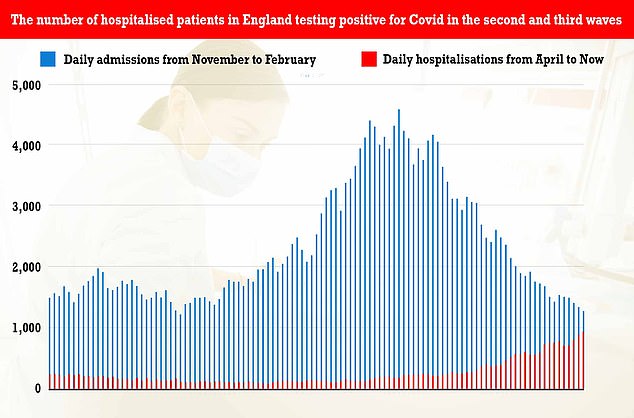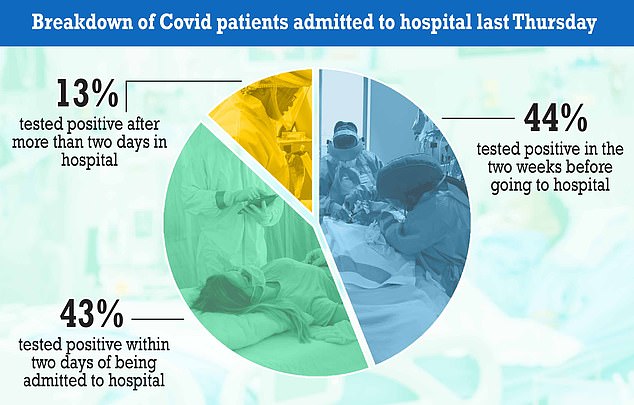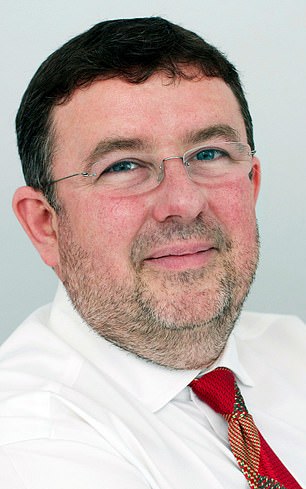More than half of people labelled as a Covid hospital patient in England only tested positive after being admitted for a different reason, leaked figures show.
The NHS England data suggests the pressure of the third wave on hospitals may be even less severe than the daily numbers let on.
There were 827 patients admitted for Covid in England last Thursday, according to the Government’s coronavirus dashboard.
But 56 per cent of these were only diagnosed with the virus after being in hospital for a different illness, with some patients only testing positive weeks later, according to data seen by The Telegraph.
Experts slammed the finding as ‘misleading’ and said officials must do more to differentiate between actual Covid admissions and ‘incidental’ cases.
Increased testing – officials are doing more now than ever before – and high levels of transmission in the community will have played a role, they said.
It comes after MailOnline’s analysis earlier this month found 40 per cent of Covid ‘admissions’ were in hospital for other reasons.
Tory MPs are now demanding new figures be published every day to paint a clearer picture of pressures on the NHS.
But health service bosses claimed today that trusts are just as busy as they were in the second wave of the pandemic, when there were more than 4,000 Covid admissions per day.
They said medics were juggling frantic efforts to chop down the 5.3million backlog of patients before winter as well as record numbers in A&E admissions.
It comes as Covid infections fell for the sixth day in a row in the UK for the first time since November. Latest hospital admission data shows there were 922 on July 22, up a quarter on the previous week.

The red bars show the number of patients being admitted to hospitals in England every day up July 20, while the blue bars show hospital admissions during the second wave, which peaked in January when 4,134 went to hospital with Covid in a single day

Figures for hospitalisations in England show that just 44 per cent of the 827 people categorised as being hospitalised with Covid last Thursday tested positive in the two weeks before going to hospital. An additional 43 per cent tested positive for the virus within two days of being admitted, while the remaining 13 per cent were found to have the virus after two days in hospital
Figures for hospitalisations in England show that just 44 per cent of the 827 people categorised as being hospitalised with Covid last Thursday tested positive in the two weeks before going to hospital.
An additional 43 per cent tested positive for the virus shortly after admission, while the remaining 13 per cent were found to have the virus after two days in hospital.
Covid testing is mandatory in all hospitals and patients are regularly checked for the virus, no matter what they are in hospital for.
It means patients giving birth or getting routine operations may be being added to the daily numbers.
How long is the NHS waiting list?
More than 5million people in England are now waiting for NHS hospital treatment — the highest number ever recorded.
Official data released in June showed the number now stands at 5.12million, and has risen consistently since the Covid pandemic began.
Statistics released for the first time also revealed the true extent of the NHS backlog, with almost 65,000 patients waiting at least 18 months for routine operations, such as hip and knee replacements.
Around 2,700 patients haven’t been treated within two years.
Critics slammed the ‘grim milestone’, calling on ministers to make tackling the ‘gigantic’ backlog their top priority. The Royal College of Surgeons called the data on patients waiting at least one year ‘particularly troubling’.
Hospitals turned their attention to treating coronavirus patients during the first and second waves, cancelling thousands of non-urgent procedures.
Health chiefs fear non-Covid care could be threatened again if the Indian variant’s rapid spread — which has left hopes of ‘Freedom Day’ going ahead on a knife-edge — causes hospital admissions to spike.
Vaccines have broken the link between cases and serious illness, but SAGE advisers still fear the mutant strain could trigger a ‘substantial’ third wave.
Millions of over-50s have yet to be fully vaccinated and data shows a single dose is slightly less effective against the Delta variant, which has bolstered calls for No10 to delay June 21 to give the NHS more time to dish out top-up jabs.
Advertisement
Hospitalisations are also significantly lower now than in the previous waves. At the peak of the first wave last April, the number of people seeking hospital care hit 3,099.
Daily figures jumped to 4,134 at the peak of the second wave in January.
Professor Carl Heneghan, director of the Centre for Evidence-Based Medicine at the University of Oxford, told The Telegraph: ‘This data is incredibly important, and it should be published on an ongoing basis.
‘When people hear about hospitalisations with Covid, they will assume that Covid is the likely cause, but this data shows something quite different – this is about Covid being detected after tests were looking for it.’
He said the Government should publish clearer figures to outline whether the virus was the primary cause of admission, as the numbers could be exaggerating NHS pressure.
Sir Graham Brady, the chairman of the 1922 committee of Tory MPs, told the paper: ‘Nearly 18 months into the Covid crisis, it is absurd that data breaking down hospital admissions still isn’t publicly available on a regular basis.
‘Counting all patients who test positive as Covid hospitalisations is inevitably misleading and gives a false picture of the continuing health impact of the virus.’
Greg Clark, the chairman of Commons science and technology select committee said he would ask Health Secretary Sajid Javid to regularly release a breakdown of numbers actually in hospital due to the virus.
An NHS spokesman said: ‘Many patients are admitted to hospital because of their Covid symptoms and complications, which are then confirmed with a post-admission Covid test, and for others they may initially be presymptomatic or asymptomatic.’
A NHS data expert told the Telegraph: ‘It creates an impression that all these people are going into hospital with Covid, and that simply is not the case.
‘People are worried and scared and not really understanding the true picture – that is what I find despicable.’

NHS Providers chief executive Chris Hopson warned the NHS ‘feels as busy as it did’ in January during the peak of the second wave
Cambridge University epidemiologist Dr Raghib Ali and Dr Simon Clarke, a microbiologist at Reading University, told MailOnline that ‘incidental’ hospital Covid cases will become more common as the outbreak grows.
There are still some patients who fall gravely ill with the virus and do not get tested until they arrive at hospital, Dr Raghib said, but this is happening less often now that testing is so widespread.
Fewer people are becoming severely ill thanks to the vaccines. Professor Paul Hunter, an expert in medicine at the University of East Anglia, said that by next winter ‘most cases admitted with a positive test will not be admitted because of Covid’.
But Chris Hopson, the chief executive of NHS Providers, told Times Radio this morning the health service is facing as much pressure as it did in January, despite treating less Covid patients.
Hospitals are still required to separate any patient who tests positive, no matter what condition they were primarily admitted for, which puts extra pressure on the NHS.
Stringent infection control measures and repeated lockdowns during the pandemic have led to a record waiting list of 5.3million in England.
He said: ‘What’s particularly striking is how much over the last few weeks our trust chief executives have said the pressure and the shape of the pressure is very different in terms of the Covid caseload is much lower.
‘But if you add all of the things we’ve got going on, full pelt on the backlog recovery, we’ve got record demand for urgent care.
‘We have got growing numbers of Covid cases, we’ve then lost about 10,000 to 15,000 beds of the normal 100,000 beds to ensure we’ve got infection control in place, we’ve got large numbers of staff self-isolating, we do have growing numbers of staff off with stress and we’re now at peak summer leave.
‘What trust chief executives are saying to us is that if you add all of that together and you have a ‘pressureometer’ where you measure the total pressure, what they’re saying to us is in many cases this now feels as busy as it did and as pressured as it did in January. ‘The shape of the pressure just looks very different.’
Up to 40% of ‘Covid hospital patients’ infected with Delta variant may have been admitted for a different illness, official figures suggest
Four out of 10 patients hospitalised with the Indian Covid variant in England may have been admitted for something else, MailOnline analysis of official data suggests.
Public Health England’s fortnightly report on the ‘Delta’ strain showed a total of 1,904 people had spent at least one night in hospital with the mutant virus by June 21.
But the agency admits 739 (39 per cent) of these patients may have gone to hospital for a different condition or injury and tested positive through routine NHS testing.
Experts said the findings show that a significant number of the Covid admissions reported by the Government every day will be ‘incidental cases’.
Cambridge University epidemiologist Dr Raghib Ali and Dr Simon Clarke, a microbiologist at Reading University, told MailOnline that this will become more common as the outbreak grows. Officials expect there to be at least 100,000 Covid infections per day by next month.
There are still some patients who fall gravely ill with the virus and do not get tested until they arrive at hospital, Dr Raghib said, but this is happening less often now that testing is so widespread.
Fewer people are becoming severely ill thanks to the vaccines. Professor Paul Hunter, an expert in medicine at the University of East Anglia, said that by next winter ‘most cases admitted with a positive test will not be admitted because of Covid’.
PHE’s figures also show that of the Indian variant patients who presented at A&E by June 21, just over three in 10 spent the night in hospital, with the rest sent home on the same day.
The promising stats come amid growing anecdotal reports of hospital Covid patients having milder symptoms than in previous waves, due to vaccines and the fact younger people now make up a greater proportion of cases.

Public Health England’s fortnightly report on the ‘Delta’ strain showed a total of 1,904 people had spent at least one night in hospital with the mutant virus by June 21. But the agency admits 739 (39 per cent) of these patients may have gone to hospital for a different condition or injury and tested positive through routine NHS testing

PHE’s figures also show that of the Indian variant patients who presented at A&E by June 21, just over three in 10 spent the night in hospital, with the rest sent home on the same day
Professor Clarke said MailOnline’s analysis highlighted the need to be wary of using general hospital admission figures as an indicator of how much severe disease is being caused by Covid.
‘It’s detecting the proportion of Covid in society, but what it’s doing is meaning the total number of admissions is not a good indicator of the disease burden.
‘And that is reflected in the low number of people who are going into intensive care [compared to general admissions].’
Dr Ali said the PHE data provided ‘some evidence that there are a higher proportion of patients now that have Covid as an incidental finding’ than in previous waves.
The fact there is far more testing now than ever before — roughly a million swabs are deployed daily now compared to 400,000 in winter — means it’s a ‘reasonable assumption’ that more incidental cases will be picked up in the NHS.
Professor Hunter said this will become more of an issue if community transmission continues to increase.
He told MailOnline: ‘There is no doubt that the overall figures on hospitalisation will include cases who just happen to be positive and are picked up by routine screening when they are admitted for something else.
‘This will become more of an issue as more people have mild or asymptomatic infections as a result of vaccination or prior infection.’
Like Dr Ali, Professor Hunter warned that disentangling the primary cause of admission among Covid hospital patients was difficult.
‘It’s difficult to know for sure, sometimes even in an individual patient. For example, take someone who has been admitted following a car crash and tests positive. Did they crash because the were driving when not well?
‘This is more likely to be an issue in younger people and children where a higher proportion of admissions with a positive test may not be admitted because of the disease. It’s also more likely in the vaccinated.
‘I suspect in a year or so most cases admitted with a positive test will not be admitted because of Covid.’
Hospitals are still required to separate any patient who tests positive, no matter what condition they were primarily admitted for, which puts extra pressure on the NHS.
Stringent infection control measures and repeated lockdowns during the pandemic have led to a record waiting list of 5.3million in England.
PHE said that of the 1,904 Indian variant patients, it was confident 1,165 were admitted primarily for Covid. The other 739 patients tested positive for the virus for the first time on the same day they were admitted.
The agency said it separated these patients in its reporting to ‘help remove cases picked up via routine testing in healthcare settings whose primary cause of attendance is not COVID-19’.
It added: ‘Some of the cases detected on the day of admission may have attended for a diagnosis unrelated to Covid.’
Source link : https://www.dailymail.co.uk/news/article-9829551/Over-half-Covid-hospitalisations-tested-positive-admission.html











